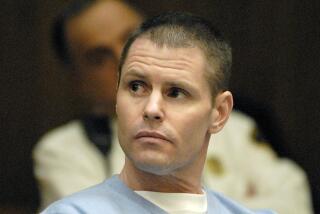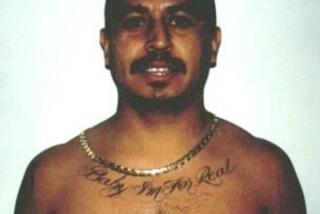James âWhiteyâ Bulger guilty in gangland slaying-racketeering case
James âWhiteyâ Bulger, the feared Boston mob boss who became one of the nationâs most-wanted fugitives, was convicted Monday in a string of 11 killings and other gangland crimes, many of them committed while he was said to be an FBI informant.
Bulger, 83, showed no reaction on hearing the verdict, which brought to a close a case that not only transfixed the city with its grisly violence but exposed corruption inside the Boston FBI and an overly cozy relationship between the bureau and its underworld snitches.
Bulger was charged primarily with racketeering, a catchall offense that listed 33 criminal acts -- among them, 19 murders that he allegedly helped orchestrate or carried out himself during the 1970s and â80s while he led the Winter Hill Gang, Bostonâs Irish mob. The racketeering charge also included acts of extortion, money-laundering and drug dealing.
The jury had to find he committed only two of those acts to convict him of racketeering. After 4 1/2 days of deliberations, it decided he took part in 11 of those murders, along with nearly all of the other crimes.
Bulger could get life in prison, but given his age, even a modest term could amount to a life sentence for the slightly stooped, white-bearded defandant.
During the two-month trial, federal prosecutors portrayed him as a cold-blooded, hands-on boss who killed anyone he saw as a threat, along with innocent people who happened to be in the wrong place at the wrong time. Then, according to testimony, he would go off and take a nap while his underlings handled the cleanup.
Among other things, Bulger was accused of strangling two women with his bare hands, shooting two men in the head after chaining them to chairs and interrogating them for hours, and opening fire on two men as they left a South Boston restaurant.
Bulger, the model for Jack Nicholsonâs sinister crime boss in the 2006 Martin Scorsese movie âThe Departed,â was seen for years as a kind of benevolent tough guy who bought Thanksgiving turkeys for fellow residents of working-class South Boston and kept hard drugs out of the neighborhood. But that image was shattered when authorities started digging up bodies.
âThis is not some Robin Hood story about a guy who kept angel dust and heroin out of Southie,â prosecutor Fred Wyshak told the jury in closing arguments.
Bulger skipped town in 1994 after being tipped off -- by a retired FBI agent, John Connolly, it turned out -- that he was about to be indicted.
During 16 years on the run, Bulger was on the FBIâs 10 most-wanted list. He was finally captured in 2011 in Santa Monica, where he had been living in a rent-controlled apartment near the beach with his longtime girlfriend, Catherine Greig. She was sentenced to eight years in prison for helping Bulger evade the law.
His disappearance proved a major embarrassment to the FBI when it came out at court hearings and trials that Bulger had been an informant from 1975 to 1990, feeding the bureau information on the rival New England Mafia as well as members of his own gang while he continued to kill and intimidate.
Those proceedings also revealed that Bulger and his gang paid off several FBI agents and state and Boston police officers, dispensing Christmas envelopes of cash and cases of fine wine to get information on search warrants, wiretaps and investigations and stay one step ahead of the law.
At his trial, Bulgerâs lawyers tried to turn the tables on the government, detailing the corruption inside the FBI and accusing prosecutors of offering absurdly generous deals to three former Bulger loyalists to testify against him.
The defense portrayed the three key witnesses -- gangster Stephen The Riflemanâ Flemmi, hit man John Martorano and Bulger protege Kevin Weeks -- as pathological liars who pinned their own crimes on Bulger so they could get reduced sentences.
But overall, the defense barely contested many of the charges against Bulger. In fact, Bulgerâs lawyers conceded that he ran a criminal enterprise that raked in millions of dollars through drugs, gambling and loansharking.
His lawyers did strongly deny he killed women, something Bulger evidently regarded as a violation of his underworld code of honor. And they spent a surprising amount of time disputing he was a âratâ -- a label that seemed to set off the hotheaded Bulger more than anything else, causing him to erupt in obscenities in the courtroom.
Bulgerâs lawyers argued that Connolly, Bulgerâs supposed handler inside the FBI, fabricated Bulgerâs thick informant file to cover up his corrupt relationship with the gangster and advance his own career. At the time, bringing down the Mafia was a major priority for the FBI.
The prosecutionâs witnesses also included numerous drug dealers, bookmakers and legitimate businessmen who described terrifying encounters with Bulger in which he ordered them to pay up or take a beating or worse.
Real estate developer Richard Buccheri said Bulger threatened to kill him and his family if he did not pay $200,000. Buccheri related how Bulger slammed his hand on a table in anger.
âWith that, he takes the shotgun that was on the table -- he sticks it in my mouth,â Buccheri said as spectators in the courtroom gasped.
Before the trial, Bulgerâs lawyers said he would take the stand and detail the corruption inside the FBI. Bulger planned to argue he was given immunity for all his crimes by a now-dead federal prosecutor. But Judge Denise Casper disallowed such a defense, and Bulger did not testify.
âI feel that Iâve been choked off from having an opportunity to give an adequate defense,â he complained to the judge as the trial wound down. âMy thing is, as far as Iâm concerned, I didnât get a fair trial, and this is a sham, and do what youse want with me. Thatâs it. Thatâs my final word.â
Bulgerâs life story fascinated Bostonians for decades. He grew up in a South Boston housing project and quickly became involved in crime, while his younger brother, William, rose to become one of the most powerful politicians in Massachusetts as state Senate president.
William Bulger was forced to resign as president of the University of Massachusetts system in 2003 after he testified before a congressional committee investigating the FBIâs ties to his brother and acknowledged receiving a call from him after he fled Boston.
Two years earlier, William Bulger told a grand jury he did not urge his brother to surrender because he didnât âthink it would be in his interest to do so.â
ALSO:
Sinkhole causes resortâs villa to collapse near Disney World
New Hampshire man kills son, 9, and then self during YWCA visit
Tennessee judge, citing Jesus, changes babyâs name from âMessiahâ
More to Read
Sign up for Essential California
The most important California stories and recommendations in your inbox every morning.
You may occasionally receive promotional content from the Los Angeles Times.










